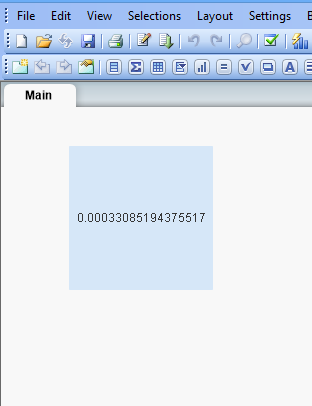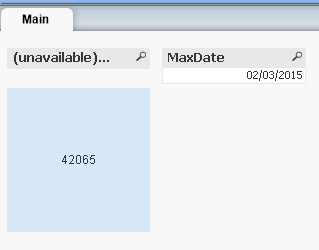Unlock a world of possibilities! Login now and discover the exclusive benefits awaiting you.
- Qlik Community
- :
- All Forums
- :
- QlikView App Dev
- :
- Date Format - Timestamp
- Subscribe to RSS Feed
- Mark Topic as New
- Mark Topic as Read
- Float this Topic for Current User
- Bookmark
- Subscribe
- Mute
- Printer Friendly Page
- Mark as New
- Bookmark
- Subscribe
- Mute
- Subscribe to RSS Feed
- Permalink
- Report Inappropriate Content
Date Format - Timestamp
Dear All,
I'm trying to extract Max Date from attached file in a load script.
Here is my script:
Floor(Max(TimeStamp#([date/time], 'DDMMMYYY:hh:mm:ss'))) AS MaxDate
But when I reload the script then nothing is coming. My current input and required output is given below.
Current Date Format:
| date/time |
| Mar 2, 2015 12:11:11 AM PST |
| Mar 2, 2015 12:11:22 AM PST |
Required Output:
02/03/2015
or
02/03/2015 12:11:22 AM
Kindly find attached file.
Kind regards,
Ishfaque Ahmed
- Tags:
- loadscript
Accepted Solutions
- Mark as New
- Bookmark
- Subscribe
- Mute
- Subscribe to RSS Feed
- Permalink
- Report Inappropriate Content
For the variable use case , you need to apply Date() and Timestamp() after the max. So i changed my sample below to do that and capture the maxes.
Dates:
Load
Timestamp(DateTime,'DD/MM/YYYY hh:mm:ss tt') as DateTime,
Date( floor(DateTime),'DD/MM/YYYY') as Date;
LOAD
Timestamp#( mid([date/time],1, len([date/time])-4) ,'MMM D, YYYY hh:mm:ss tt') as DateTime,
[settlement id],
type,
[order id]
FROM
(txt, codepage is 1252, embedded labels, delimiter is ',', msq);
MaxDate:
load Timestamp(max(DateTime),'DD/MM/YYYY hh:mm:ss tt') as maxDateTime,
Date(max(Date),'DD/MM/YYYY') as maxDate
Resident Dates;
let vMaxDateTime=peek('maxDateTime',0,'MaxDate');
let vMaxDate=peek('maxDate',0,'MaxDate');
- Mark as New
- Bookmark
- Subscribe
- Mute
- Subscribe to RSS Feed
- Permalink
- Report Inappropriate Content
had to strip off the timezone with a mid() function. the rest you are on the right track:
Load
Timestamp(DateTime,'DD/MM/YYYY hh:mm:ss tt') as DateTime,
Date( floor(DateTime),'DD/MM/YYYY') as Date;
LOAD
Timestamp#( mid([date/time],1, len([date/time])-4) ,'MMM D, YYYY hh:mm:ss tt') as DateTime,
[settlement id],
type,
[order id]
FROM
(txt, codepage is 1252, embedded labels, delimiter is ',', msq);
- Mark as New
- Bookmark
- Subscribe
- Mute
- Subscribe to RSS Feed
- Permalink
- Report Inappropriate Content
Dear Jonathan,
Your answer is right, can you explain little bit?
Kind regards,
Ishfaque Ahmed
- Mark as New
- Bookmark
- Subscribe
- Mute
- Subscribe to RSS Feed
- Permalink
- Report Inappropriate Content
This will extract the date and time portions separately
date(floor(date#(replace(date_value, 'PST', ''), 'MMM D, YYYY hh:mm:ss TT')))
and this will extract the time
time(frac(date#(replace(date_value, 'PST', ''), 'MMM D, YYYY hh:mm:ss TT')))
or for both combined
timestamp(date#(replace(date_value, 'PST', ''), 'MMM D, YYYY hh:mm:ss TT'))
MMM is Month
D is day of Month
YYYY is year
hh is hour
mm is minute
ss seconds
TT is AM or PM
The replace() removes the PST timezone
date# and time# convert the string values to a date or time respectively
- Mark as New
- Bookmark
- Subscribe
- Mute
- Subscribe to RSS Feed
- Permalink
- Report Inappropriate Content
Dear Jonathan,
When I'm going to store MaxDate field into variable using Let, then it's returning me decimal number instead of Max Date, such as illustrated in attached screenshot.
Here is a variable logic,
// Find Last Modified Date - Preceding Load
LOAD //Timestamp(MaxDateTimestamp,'DD/MM/YYYY hh:mm:ss tt') as [date/time], // If you need Max Date with timestamp then uncomment this line
Max(Date(Floor(MaxDateTimestamp),'DD/MM/YYYY')) as MaxDate
Group By MaxDateTimestamp;
// Loading Data from QVD
Last_Updated_Date:
LOAD Max(Timestamp#(Mid([date/time], 1, Len([date/time])-4),'MMM D, YYYY hh:mm:ss tt')) as MaxDateTimestamp
FROM
[$(vFolderSourceData)QVDs\Sales.qvd]
(qvd);
// Store Last Modified Date to a Variable
LET Last_Updated_Date = Peek('MaxDate', 0, 'Last_Updated_Date');
// Drop Table Sales
DROP Table Last_Updated_Date;

Kind regards,
Ishfaque Ahmed
- Mark as New
- Bookmark
- Subscribe
- Mute
- Subscribe to RSS Feed
- Permalink
- Report Inappropriate Content
Sure,
The first part is this expression. I'm using mid() function to strip off the last 4 characters, in this case ' PST'. Mid() will take the first characters up to the date length - 4.
mid([date/time],1, len([date/time])-4)
so: Mar 2, 2015 12:11:22 AM PST
turns into: Mar 2, 2015 12:11:22 AM
Then i interpret it as a timestamp which stores date and time . Timestamp# is an interpretive function so you use MMM for 'jan' , D for single or double digit days like '1' or '12' (not 01) and so forth. 'tt' means am or pm.
Timestamp#( mid([date/time],1, len([date/time])-4) ,'MMM D, YYYY hh:mm:ss tt')
the result needs to be formatted for output.
In the preceding load i format i 2 ways:
Timestamp(DateTime,'DD/MM/YYYY hh:mm:ss tt') as DateTime ... renders as '02/03/2015 12:11:22 AM'
And then here i use floor() which rounds the date down to a whole number. This is because dates in qlik are numeric and dates with times are numbers with decimals. So if you want to strip off the time, use floor()
Date( floor(DateTime),'DD/MM/YYYY') as Date .... renders as '02/03/2015'
Any help ? See the attached to help you with the D , M , Y etc..
- Mark as New
- Bookmark
- Subscribe
- Mute
- Subscribe to RSS Feed
- Permalink
- Report Inappropriate Content
Any update? regards above attached screenshot.
- Mark as New
- Bookmark
- Subscribe
- Mute
- Subscribe to RSS Feed
- Permalink
- Report Inappropriate Content
Dear All,
When I'm using following Let statment, then it's returning me number instead of date.
LET Last_Updated_Date = date#(Floor(Peek('MaxDate', 0, 'Last_Updated_Date')), 'DD/MM/YYYY');
Current out is 42065 instead of 02/03/2015

Kind regards,
Ishfaque Ahmed
- Mark as New
- Bookmark
- Subscribe
- Mute
- Subscribe to RSS Feed
- Permalink
- Report Inappropriate Content
For the variable use case , you need to apply Date() and Timestamp() after the max. So i changed my sample below to do that and capture the maxes.
Dates:
Load
Timestamp(DateTime,'DD/MM/YYYY hh:mm:ss tt') as DateTime,
Date( floor(DateTime),'DD/MM/YYYY') as Date;
LOAD
Timestamp#( mid([date/time],1, len([date/time])-4) ,'MMM D, YYYY hh:mm:ss tt') as DateTime,
[settlement id],
type,
[order id]
FROM
(txt, codepage is 1252, embedded labels, delimiter is ',', msq);
MaxDate:
load Timestamp(max(DateTime),'DD/MM/YYYY hh:mm:ss tt') as maxDateTime,
Date(max(Date),'DD/MM/YYYY') as maxDate
Resident Dates;
let vMaxDateTime=peek('maxDateTime',0,'MaxDate');
let vMaxDate=peek('maxDate',0,'MaxDate');